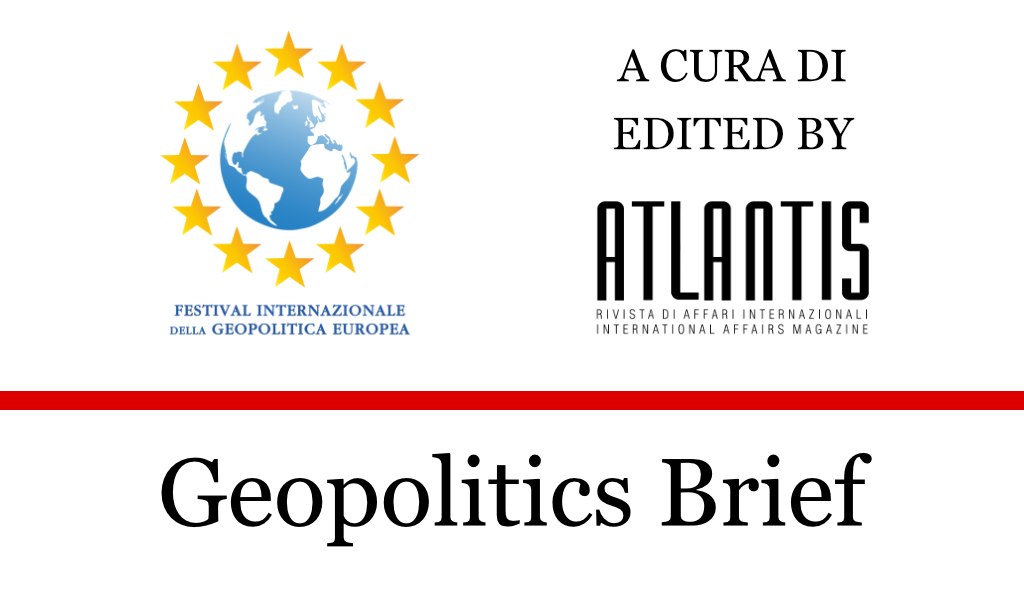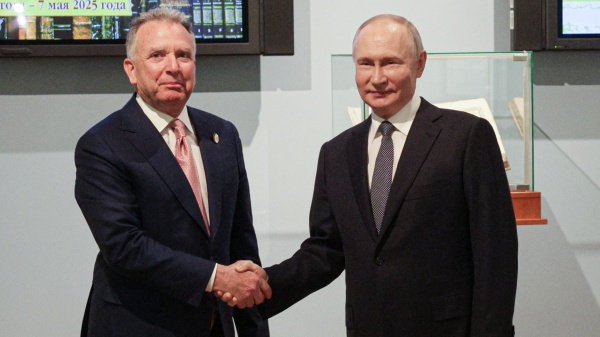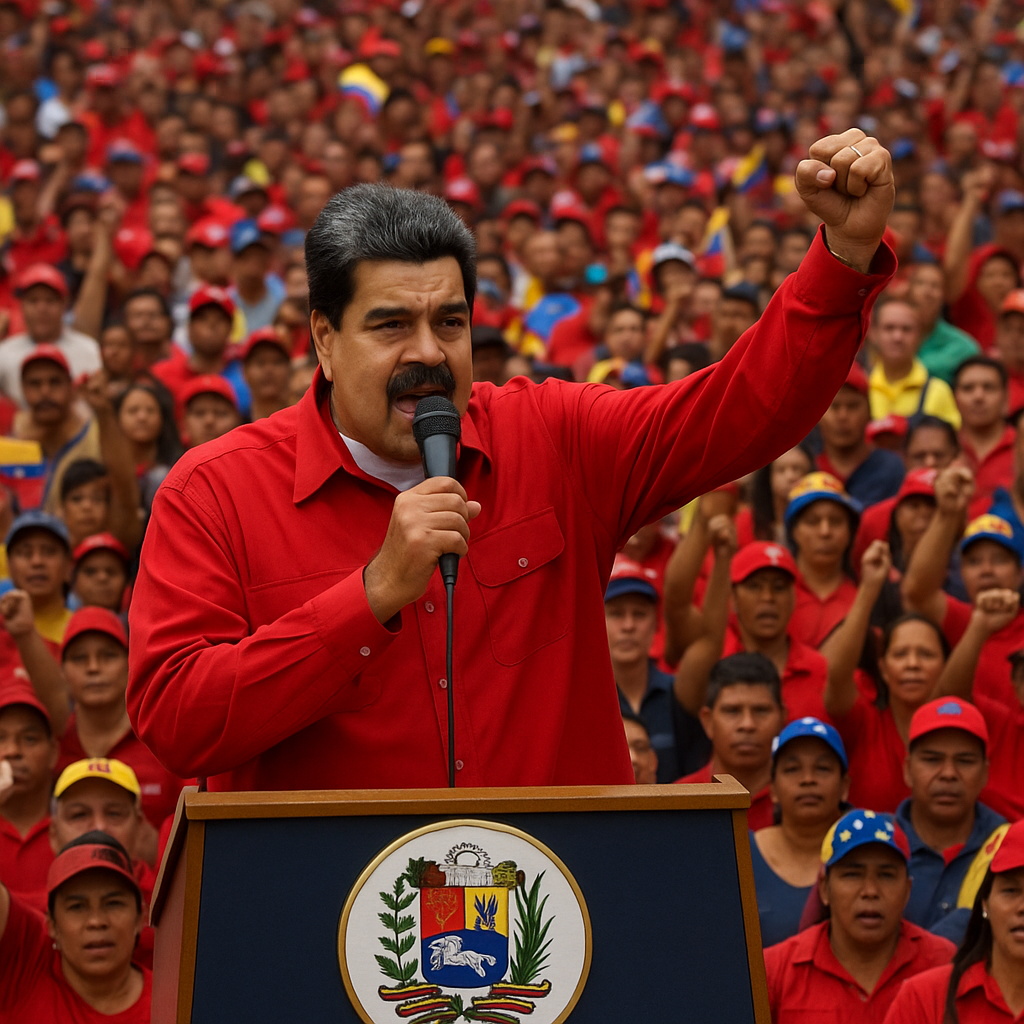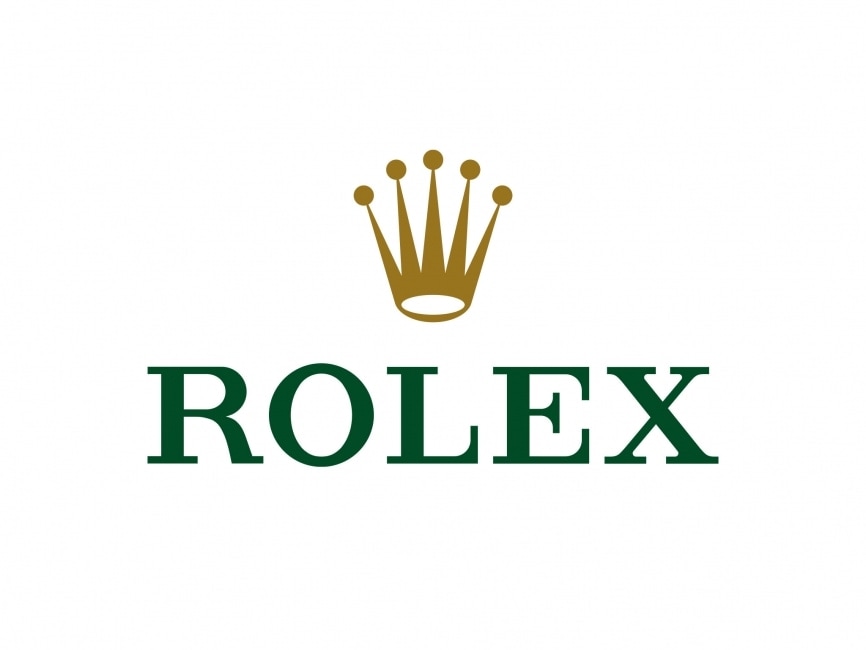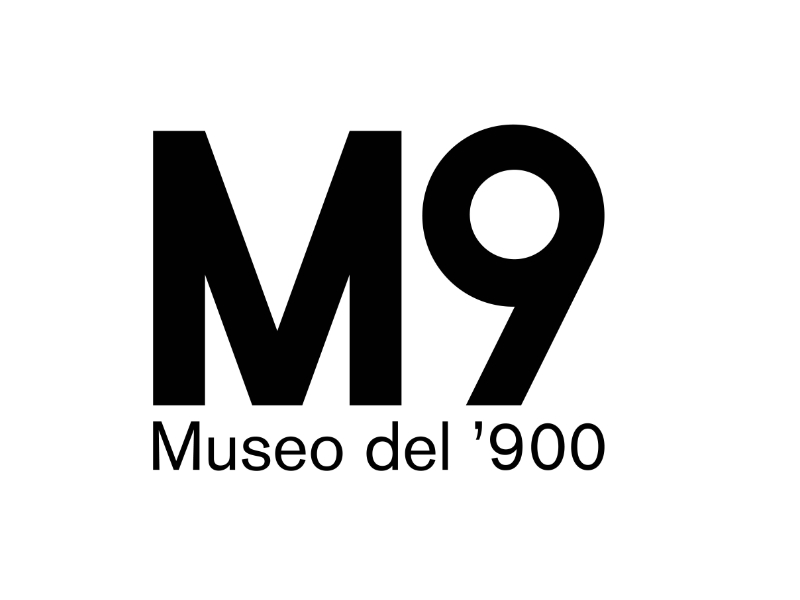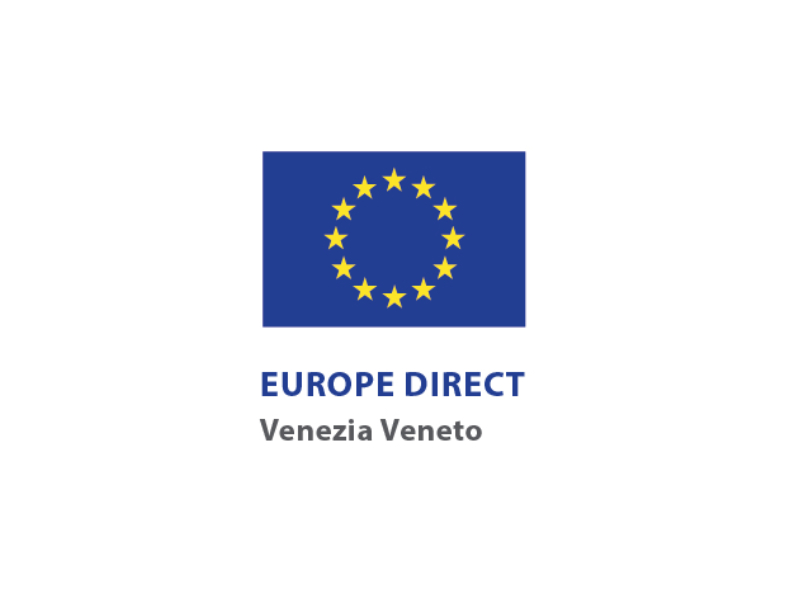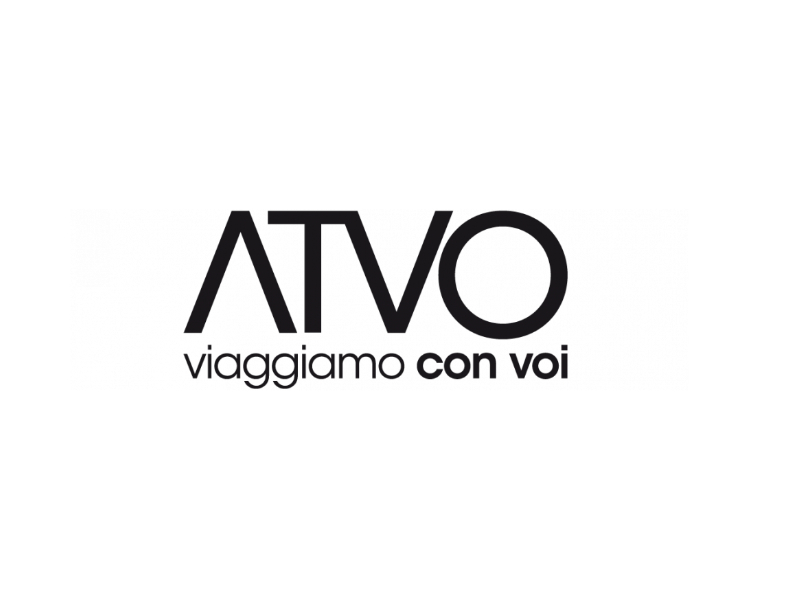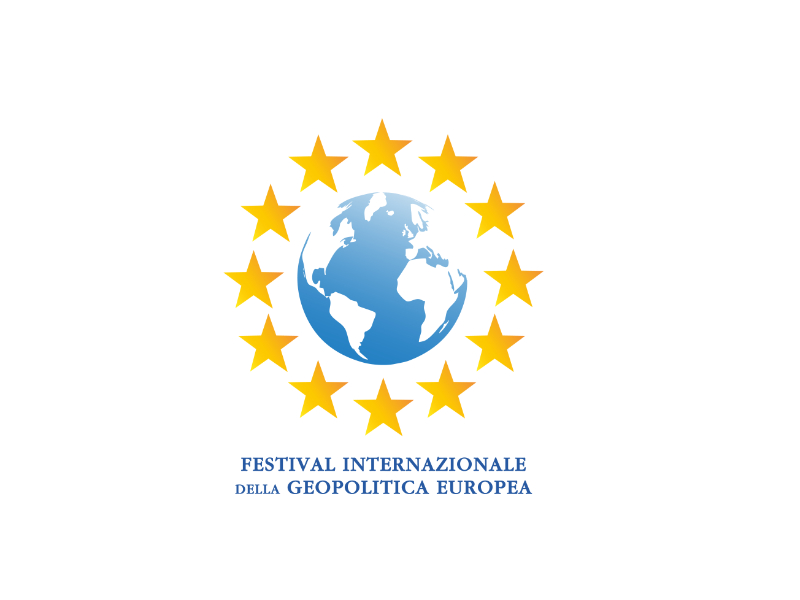Le recenti considerazioni dell'ammiraglio Giuseppe Cavo Dragone, presidente del Comitato militare della Nato, hanno riacceso l'attenzione sul dibattito interno all'Alleanza riguardo alla gestione delle minacce ibride attribuite alla Russia. In un'intervista al Financial Times, l'ammiraglio ha spiegato che l'organizzazione sta valutando l'ipotesi di...
Atlantis Magazine
Ultime News
Enridi un nuovo quadro di sicurezza per l'Europa orientale, avanzata da Washington, punta a definire una via d'uscita diplomatica al conflitto tra Russia e Ucraina. Al centro del progetto, rivelato da una fonte dell'amministrazione americana, c'è un punto cardine: Kiev non entrerà nella NATO, ma riceverà una protezione militare formale da parte...
Dopo il massiccio schieramento di forze nel Mar dei Caraibi, Donald Trump ha lasciato intendere di aver definito la sua strategia nei confronti del Venezuela. Il presidente ha ricevuto briefing dettagliati dal Pentagono e dal Consiglio per la Sicurezza Nazionale sulle possibili operazioni, che spaziano da raid mirati contro infrastrutture militari...
La Rivista

Atlantis 2/2025
Corsa allo spazio e filosofia del diritto: la nuova frontiera tra libertà e regole
Nel momento in cui lo spazio extra-atmosferico si trasforma da palcoscenico della sfida geopolitica a territorio d'interesse economico, tecnologico e strategico, si impone una riflessione che va oltre l'ingegneria aerospaziale e le logiche di potenza. Si tratta di interrogarsi, filosoficamente e giuridicamente, su cosa significhi conquista quando il teatro non è più il pianeta Terra ma lo spazio esterno. In altre parole: quale diritto per lo spazio?
Le missioni spaziali di aziende private come SpaceX e Blue Origin, accanto agli investimenti pubblici di Stati Uniti, Cina, India, Europa, aprono scenari inediti. Al centro c'è la tensione, già ben nota al pensiero liberale, tra libertà e potere, tra iniziativa individuale e bisogno di regole. Ma lo spazio, per sua natura, sfida ogni precedente fondamento giuridico. Serve allora uno sguardo lungo, capace di tenere insieme i principi del costituzionalismo occidentale con le sfide di un mondo post-terrestre.
Un vuoto giuridico in espansione
Il diritto internazionale dello spazio, ancora fondato sul Trattato del 1967 (Outer Space Treaty), si basa su alcuni principi generali: lo spazio non può essere oggetto di appropriazione sovrana, deve essere utilizzato per scopi pacifici e a beneficio di tutta l'umanità. Ma si tratta di enunciati deboli, figli dell'epoca della Guerra Fredda, oggi messi alla prova da nuove forme di protagonismo privato e dalla corsa alle risorse extraterrestri (acqua lunare, minerali asteroidali, orbite satellitari).
Il diritto appare in ritardo rispetto all'innovazione tecnologica e al dinamismo degli attori. Questo "vuoto giuridico" è, però, tutt'altro che neutro: rischia di diventare terreno di affermazione del più forte. La domanda non è allora solo quali norme, ma quale visione del diritto deve guidare l'azione nello spazio.
Matteucci: il costituzionalismo come grammatica del potere
Il pensiero di Nicola Matteucci, figura eminente del costituzionalismo liberale italiano, offre una chiave di lettura preziosa. Per Matteucci, la funzione primaria del diritto costituzionale è quella di porre limiti al potere e proteggere la libertà. La costituzione non è una semplice tecnica normativa, ma l'espressione di una visione antropologica e politica: l'uomo è portatore di diritti anteriori allo Stato, e lo Stato è legittimo solo se li riconosce e li garantisce.
Ma come si declina questa concezione quando lo spazio diventa estensione della sfera d'azione politica, economica e tecnologica? Se il potere si proietta oltre l'atmosfera, anche la logica costituzionale dovrebbe seguirlo, senza restare confinata ai territori nazionali. Ne nasce una questione di "costituzionalismo globale dello spazio": chi definisce le regole, chi le fa rispettare, chi tutela i diritti dei futuri lavoratori spaziali o dei cittadini connessi a infrastrutture satellitari vitali?
Hayek e Friedman: libertà, mercato e ordine spontaneo
Sul fronte opposto, la scuola di Chicago, con Friedrich Hayek e Milton Friedman, guarda con sospetto a ogni tentativo di pianificazione e regolazione centralizzata. Per Hayek, l'ordine sociale nasce non dall'imposizione, ma dall'evoluzione spontanea di regole generali e astratte. Friedman, dal canto suo, esalta il mercato come spazio di libertà individuale e creatività.
Da questo punto di vista, la corsa allo spazio dovrebbe essere lasciata al dinamismo del mercato. Le imprese private non vanno ostacolate, ma semmai incoraggiate come motori del progresso. La frontiera spaziale è, in questa ottica, la prosecuzione ideale del libero mercato terrestre. Le colonie lunari o le stazioni orbitanti diventano nuove espressioni della libertà imprenditoriale, non necessariamente soggette ai codici giuridici degli Stati.
Ma qui emerge una tensione interna al liberalismo stesso: può esistere libertà senza un quadro minimo di regole? Hayek stesso parlava della necessità di un rule of law, un sistema di norme generali che garantisca prevedibilità e tutela. Senza questo, la libertà rischia di degenerare in dominio, e l'innovazione in arbitrio.
Costituzionalizzare lo spazio?
Proprio per questo, alcuni giuristi e filosofi del diritto iniziano a riflettere sull'idea di una costituzione dello spazio, o almeno di principi costituzionali spaziali: accesso equo alle risorse, tutela ambientale dell'ecosistema extraterrestre, salvaguardia dei diritti delle future generazioni, difesa contro forme di neo-colonialismo tecnologico. Non si tratta di replicare modelli terrestri, ma di pensare un nuovo ordine che tenga insieme libertà e responsabilità.
La sfida è culturale prima che tecnica. Serve un nuovo paradigma giuridico, capace di accogliere le intuizioni del liberalismo economico senza rinunciare alla funzione garantista del costituzionalismo. In gioco non c'è solo l'equilibrio tra Stato e mercato, ma la definizione stessa dell'umano nell'epoca post-terrestre.
Conclusione: tra utopia e necessità
La corsa allo spazio è oggi il luogo dove si intrecciano in modo più radicale le grandi domande della filosofia del diritto: chi ha il potere, chi lo limita, chi ne beneficia. L'espansione fuori dalla Terra non può essere un'esenzione dal diritto, ma semmai un banco di prova per i suoi principi più alti. Solo così la libertà oltre l'atmosfera potrà essere qualcosa di più della libertà del più forte.
The Space Race and the Philosophy of Law: A New Frontier Between Liberty and Limits
As outer space shifts from being the stage of geopolitical rivalry to a domain of economic, technological, and strategic interest, a reflection is needed that goes beyond aerospace engineering and power dynamics. It's time to ask a deeper philosophical and legal question: what does conquest mean when the battlefield is no longer Earth, but space itself? In other words: what kind of law applies to space?
Private missions led by companies such as SpaceX and Blue Origin, alongside public investments by the United States, China, India, and Europe, are opening unprecedented scenarios. At the core lies a tension long familiar to liberal thought: between liberty and power, between individual initiative and the need for rules. But space, by its very nature, challenges every traditional legal framework. A broader perspective is needed, one that combines the principles of Western constitutionalism with the challenges of a post-terrestrial world.
A Legal Vacuum in Expansion
International space law, still largely grounded in the 1967 Outer Space Treaty, is based on a few broad principles: space cannot be claimed by any sovereign power, it must be used for peaceful purposes, and it should benefit all humankind. But these are weak provisions, born in the Cold War era, and today they are tested by new forms of private protagonism and the race for extraterrestrial resources (lunar water, asteroid minerals, satellite orbits).
The law lags behind technological innovation and the dynamism of new players. Yet this legal vacuum is far from neutral: it risks becoming a playground for domination by the most powerful. The question is no longer simply which rules, but which vision of law should guide action in space.
Matteucci: Constitutionalism as the Grammar of Power
The thought of Nicola Matteucci, a prominent figure in Italian liberal constitutionalism, provides a valuable key. For Matteucci, the primary function of constitutional law is to limit power and protect liberty. The constitution, he argued, is not merely a legal technique, but the expression of a political and anthropological vision: the individual possesses rights that precede the State, and the State is legitimate only insofar as it recognizes and guarantees them.
But how can this vision be translated into a context where power extends beyond the Earth's atmosphere? If power projects itself into space, then constitutional logic should follow it. This raises the issue of a "global constitutionalism of space": who defines the rules, who enforces them, and who protects the rights of future space workers or Earth citizens dependent on vital satellite infrastructures?
Hayek and Friedman: Liberty, Markets, and Spontaneous Order
On the other side, the Chicago School, with Friedrich Hayek and Milton Friedman, viewed centralized planning and regulation with deep suspicion. For Hayek, social order arises not from imposition but from the spontaneous evolution of general and abstract rules. Friedman, meanwhile, celebrated the market as the space of individual freedom and creativity.
From this viewpoint, the space race should be left to market dynamism. Private enterprises are not to be hindered, but encouraged as engines of progress. The space frontier becomes the ideal extension of Earth's free market. Lunar colonies or orbital stations appear as new expressions of entrepreneurial freedom, not necessarily subject to the legal codes of nation-states.
But this raises a fundamental tension within liberalism itself: can freedom exist without a minimal framework of shared rules? Hayek himself insisted on the necessity of the rule of law, a system of general rules ensuring predictability and protection. Without this, freedom risks collapsing into domination, and innovation into arbitrariness.
Constitutionalizing Space?
For this reason, some legal scholars and philosophers have begun to reflect on the idea of a constitution for space, or at least constitutional principles applicable beyond Earth: equitable access to resources, environmental protection of extraterrestrial ecosystems, safeguarding the rights of future generations, and defense against technological neocolonialism. This does not mean replicating terrestrial models, but rather envisioning a new order that reconciles liberty with responsibility.
The challenge is cultural more than technical. We need a new legal paradigm—one that embraces the insights of economic liberalism without abandoning the protective function of constitutionalism. At stake is not only the balance between state and market, but the very definition of what it means to be human in a post-terrestrial era.
Conclusion: Between Utopia and Necessity
The space race is today the arena where the great questions of legal philosophy converge: who holds power, who limits it, and who benefits from it. The expansion beyond Earth must not become an escape from law, but rather a testbed for its highest principles. Only in this way can liberty beyond the atmosphere become something more than the freedom of the strongest.
Atlantis 01/2025
Ambiente, Transizione Ecologica e Sviluppo Economico in un'epoca di grandi cambiamenti Internazionali
L'epoca attuale è segnata da profondi cambiamenti geopolitici e climatici che stanno ridefinendo il futuro del pianeta. Da un lato, economie emergenti come Cina, India, Brasile, Sud Africa e Nigeria stanno crescendo a ritmi sostenuti, portando con sé significative trasformazioni sociali ed economiche. Dall'altro, il cambiamento climatico richiede norme più severe per la protezione dell'ambiente. La sfida globale consiste quindi nel conciliare lo sviluppo economico con la necessità di ridurre l'impatto ambientale, senza imporre un arresto alla crescita dei Paesi ancora afflitti dal sottosviluppo, impedendo loro di migliorare le condizioni di vita dei propri cittadini. L'Unione Europea si è posizionata come leader nella transizione ecologica, promuovendo politiche ambiziose per ridurre le emissioni di CO2, incentivare l'uso delle energie rinnovabili e ridisegnare un modello economico sostenibile. Tuttavia, questa strategia si scontra con una realtà complessa, segnata da crisi globali come la pandemia di COVID-19, conflitti internazionali e l'influenza crescente di movimenti politici conservatori e nazionalisti, come dimostrato dal ritorno di Donald Trump alla presidenza degli Stati Uniti. Le scelte politiche dell'UE si trovano ora a un bivio. Da un lato, la dipendenza energetica, emersa in modo drammatico con la crisi nei rapporti con la Russia, ha rivelato la fragilità del sistema di approvvigionamento europeo. Dall'altro, l'eccessiva delocalizzazione della produzione in Cina, specialmente nei settori chiave come l'automobile e l'elettronica, ha sollevato interrogativi sulla sostenibilità economica e strategica delle attuali politiche industriali. A questo scenario si aggiunge la crescente competizione in Africa, dove Cina e Russia stanno espandendo la loro influenza economica e politica, mentre le potenze occidentali faticano a sviluppare strategie efficaci di cooperazione e sviluppo. La corsa alle terre rare, essenziali per l'innovazione tecnologica e la transizione ecologica, sta generando nuove tensioni internazionali, così come la competizione nello Spazio, che rappresenta la nuova frontiera strategica per molte potenze globali. Nel frattempo, gli elettori europei stanno cambiando prospettiva. Se in passato l'impegno ambientale era considerato un valore indiscutibile, oggi sempre più cittadini si interrogano sulla sua compatibilità con le realtà economiche e sociali. Il costo delle politiche green, spesso percepite come utopistiche, e le difficoltà nel mantenere la prosperità economica in competizione con le potenze emergenti stanno portando a una rivalutazione delle priorità. È tempo di guardare alla costruzione dell'Unione Europea con maggiore realismo? L'UE è davvero un progetto politico liberaldemocratico, o è piuttosto la realizzazione dell'ideale di Giuseppe Mazzini e, successivamente, di Altiero Spinelli per edificare un'Europa repubblicana e socialista? Il modello di welfare europeo, basato su un forte interventismo statale e su una burocrazia pervasiva, è compatibile con la competizione globale, dove Paesi con modelli economici più snelli e meno regolamentati stanno avanzando rapidamente? Inoltre, l'Europa può davvero garantire la propria sicurezza e difesa senza dipendere dagli Stati Uniti? Il modello europeo, che privilegia il multilateralismo e una regolamentazione stringente dell'iniziativa privata, è in grado di tenere il passo con l'innovazione tecnologica necessaria per affrontare le sfide future? Mario Draghi ha recentemente sottolineato come l'Europa debba trovare un equilibrio tra regolamentazione e crescita, evitando eccessivi vincoli che soffochino l'innovazione. Questa dicotomia si riflette anche nella scelta tra due modelli simbolici di sviluppo: Greta Thunberg o Elon Musk? Da un lato, l'ambientalismo radicale che impone cambiamenti drastici e immediati; dall'altro, l'innovazione tecnologica e l'iniziativa privata come motori della transizione ecologica. È necessaria una sintesi tra queste due visioni, evitando approcci estremisti che potrebbero compromettere la competitività economica europea. Il futuro sarà davvero determinato dalla mediazione e dagli equilibri geopolitici, in quello che i britannici una volta chiamavano il Grande Gioco, o sarà modellato da chi innova senza compromessi? L'Europa e il suo patrimonio culturale—razionalista, empirista e illuminista—rimangono centrali: è impossibile ignorare questi valori, che hanno imposto la supremazia del diritto sulla legge brutale della forza, la difesa dei diritti individuali contro il fanatismo religioso e un'economia capitalista che non sia controllata dallo Stato ma che preservi il ruolo cruciale dell'individuo. Infine, quale modello istituzionale dovrebbe adottare l'Europa per affrontare le sfide del presente e del futuro? Un'Europa federalista o confederata? L'UE deve trovare un equilibrio tra l'integrazione politica e il rispetto della sovranità nazionale, evitando di diventare un sistema burocratico inefficiente o, al contrario, un insieme di Stati incapaci di agire con una strategia comune. Il futuro dell'Europa e della sua politica ambientale dipenderà dalla sua capacità di coniugare sviluppo economico, innovazione e sostenibilità in un mondo sempre più complesso e competitivo. Sarà in grado di farlo senza rimanere indietro rispetto alle grandi potenze globali?
Atlantis 01/2025
Environment, Ecological Transition, and Economic Development in an Era of Major International Changes
The current era is marked by profound geopolitical and climatic changes that are reshaping the future of the planet. On one hand, emerging economies such as China, India, Brazil, South Africa, and Nigeria are growing at rapid rates, bringing significant social and economic transformations. On the other hand, climate change necessitates stricter rules for environmental protection. The global challenge is therefore to reconcile economic development with the need to reduce environmental impact, without imposing a halt to growth on countries still afflicted by underdevelopment, preventing them from improving the living conditions of their citizens. The European Union has positioned itself as a leader in the ecological transition, promoting ambitious policies to reduce CO2 emissions, encourage the use of renewable energy, and redesign a sustainable economic model. However, this strategy faces a complex reality, marked by global crises such as the COVID-19 pandemic, international conflicts, and the rising influence of conservative and nationalist political movements, as evidenced by Donald Trump's return to the U.S. presidency. The EU's political choices now stand at a crossroads. On one hand, energy dependence, dramatically exposed by the crisis in relations with Russia, has revealed the fragility of the European supply system. On the other hand, the excessive outsourcing of production to China, especially in key sectors such as automobiles and electronics, has raised questions about the economic and strategic sustainability of current industrial policies. Adding to this scenario is the increasing competition in Africa, where China and Russia are expanding their economic and political influence, while Western powers struggle to develop effective strategies for cooperation and development. The race for rare earth elements, essential for technological innovation and the ecological transition, is generating new international tensions, as is the competition in space, which represents the new strategic frontier for many global powers. Meanwhile, European voters are shifting their perspective. While environmental commitment was once considered an unquestionable value, today more citizens question its compatibility with economic and social realities. The cost of green policies, often perceived as utopian, and the challenges of maintaining economic prosperity in competition with emerging powers are leading to a reassessment of priorities. Is it time to view the construction of the European Union with greater realism? Is the EU truly a liberal-democratic political project, or is it rather the realization of the ideal of Giuseppe Mazzini and later Altiero Spinelli to build a republican and socialist Europe? The European welfare model, based on strong state intervention and pervasive bureaucracy, is it compatible with global competition, where countries with leaner and less regulated economic models are advancing rapidly? Moreover, can Europe truly ensure its security and defense without depending on the United States? The European model, which prioritizes multilateralism and stringent regulation of private enterprise, is it capable of keeping pace with the technological innovation necessary to meet future challenges? Mario Draghi recently emphasized that Europe must find a balance between regulation and growth, avoiding excessive constraints that stifle innovation. This dichotomy is also reflected in the choice between two symbolic models of development: Greta Thunberg or Elon Musk? On one side, radical environmentalism that demands drastic and immediate changes; on the other, technological innovation and private enterprise as the driving forces of the ecological transition. A synthesis between these two visions is necessary, avoiding extremist approaches that could undermine Europe's economic competitiveness. Will the future truly be determined by mediation and geopolitical balances, in what the British once called the Great Game, or will it be shaped by those who innovate without compromise? Europe and its cultural heritage—rationalist, empiricist, and Enlightenment-driven—remain central: it is impossible to ignore these values, which have established the rule of law over the brutal law of force, the defense of individual rights against religious fanaticism, and a capitalist economy that is not state-controlled but maintains the crucial role of the individual. Finally, what institutional model should Europe adopt to address the challenges of the present and the future? A federalist or confederate Europe? The EU must find a balance between political integration and respect for national sovereignty, avoiding becoming an inefficient bureaucratic system or, conversely, a collection of states incapable of acting with a common strategy. The future of Europe and its environmental policy will depend on its ability to combine economic development, innovation, and sustainability in an increasingly complex and competitive world. Will it be able to do so without falling behind the great global powers?

